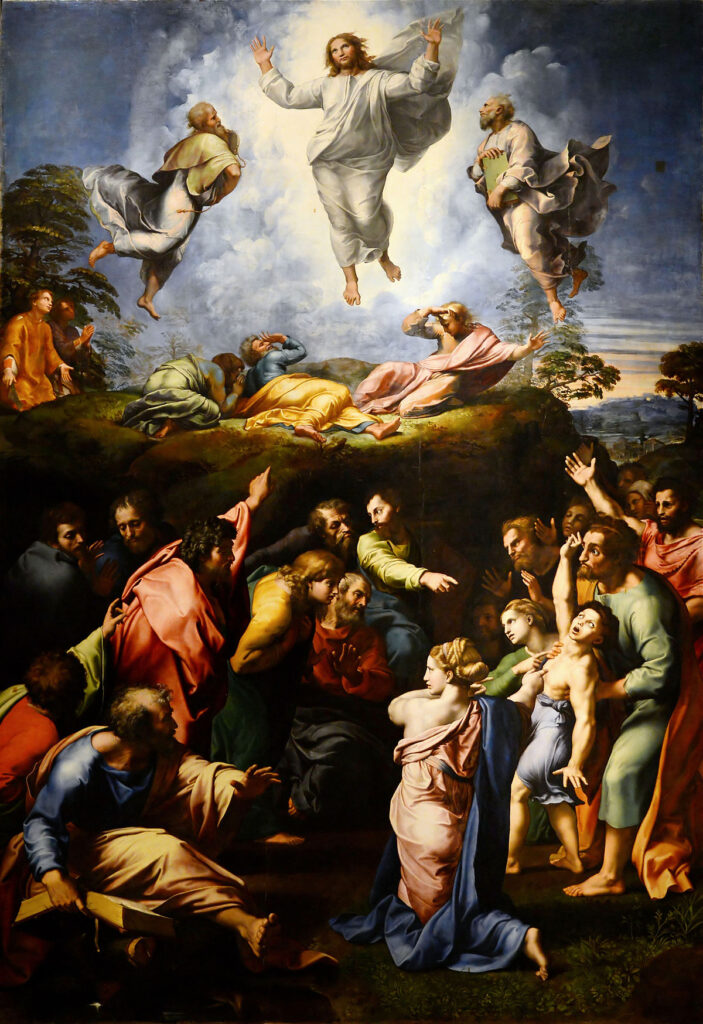Greek] ἐλεέω (eleeō), [Latin] miserere, [Latin] misericordia: to have compassion (pity), to show mercy, to feel sympathy for; 33 scriptural references

The Transfiguration: painting by Raphael (1520)
Background information:
The Transfiguration: This picture is divided into two parts: the upper part depicts the transfiguration of Christ, the lower right part depicts the boy healed from an evil spirit (epilepsy). Raphael intentionally links the transfigured Christ with the healed boy. Jesus had taken pity on the boy and had healed him. Both Christ and the boy are risen up. In ancient Greek, Roman, and Christian times, epilepsy was thought as an unnatural, mysterious illness which is not of this world. Epilepsy was thought to be influenced by the moon. Epilepsy was believed to be caused by demons. This falling sickness was called morbus daemonicus (demonic disease) at that time. Hence, the boy was called a ‘lunatic’. In ancient times, epilepsy was just as common as it is today. Interestingly, the healed boy is the only person in the painting (bottom right) whose face is turned up at the transfigured Christ.
Greek Hellenism: This term means to have compassion, to show mercy, and to have pity. Mercy is the emotion evoked in response to an affliction which another person experiences. In Greek thought, mercy is an emotion rather than a moral relationship to others. Mercy entails partiality. Deities and judges can often become sources of mercy. Homer’s Odyssey 5.191 states “For I too have a mind that is righteous, and the heart in this breast is not of iron, but hath compassion.” Plato’s Laws 731b states “Every man ought to be at once passionate and gentle in the highest degree.” Aristophane’s Peace 400 states “Have mercy, mercy. Let yourself be touched by their words.” Antiphon’s Against the Stepmother for Poisoning 1.27 states “Involuntary accidents deserve such pity, not deliberately planned crimes and acts of wickedness.” Plato’s Apology 34c states “He besought the judge with many tears and brought his children to arouse compassion.”
Old Testament: This term means to have mercy, to move to pity, to show compassion, to plead for grace, to charm, to be generous, and to love. Mercy denotes a mutual relationship between man (with man), and between man (with God). These relationships can involve covenant faithfulness, obligation, love, and grace. Those who keep the covenant are called righteous, upright, and God-fearing. God keeps to His covenant promises despites man’s unfaithfulness. Through God’s will, man can often participate in His forgiveness and mercy. Perhaps, the pity and sympathy evoked between man is best described as love.
Have pity on me, Lord, for I am weak (Psa.6:3). Its dust moves them to pity (Psa.102:15). The soul of the wicked man desires evil; his neighbor finds no pity in his eyes (Pro.21:10). The just are generous in giving (Psa.37:21). We saw the anguish of his heart when he pleaded for us (Gen.42:21). I love you, Lord, my strength (Psa.18:2). The Lord gives light to the eyes of both (Pro.29:13). I who grant mercy to whom I will (Exo.33:19). I will have pity on her children (Hos.2:6).
New Testament: This term essentially means to show mercy to and to be generous.
More notable scriptural examples:
Mt.5:7: Blessed are the merciful, for they will be shown mercy. (From the Sermon on the Mount).
Mt.9:27: Son of David, have pity on us!
Mt.15:22: Jesus heals the tormented Canaanite woman.
Mt.17:7: Lord, have pity on my son, for he is a lunatic.
Mt.18:33: Should you not have had pity on your fellow servant, as I had pity on you?
Lk.16:24: The rich man cried out, Father Abraham, have pity on me.
Rom.9:15: I will show mercy to whom I will, I will take pity on whom I will.
Rom.11:30: The triumph of God’s mercy.
Rom.12:8: Since we have gifts that differ according to the grace given us, let us exercise them…if one contributes, in generosity.
1Tim.1:13: I was once a blasphemer and a persecutor and an arrogant man, but I have been mercifully treated because I acted out of ignorance in my unbelief.
Divine Mercy Sunday: When St. John Paul II canonized Sr. Faustina, he established Divine Mercy Sunday on the Sunday after Easter. The message is simply that God loves all of us. His mercy is greater than our sins. We can call upon Him with trust and receive His mercy.
Etymology: The Latin verb miserere means to have compassion (pity). The Latin noun misericordia, meaning mercy, consists of miseriae (misery) and cordis (heart). It is the nature of God’s mercy that His heart extends in our misery and redeems it. This is the answer to the mystery of human suffering as it relates to redemption. Mercy signifies that God draws our misery into His own infinitely loving heart. In a related note, the Greek kardiognostes (one who knows the heart), reference God. (Acts 1:24 and Acts 15:8)
Conclusion:
Misery, cardiac
In Greek Hellenism, it was interesting to discover that this term is more related to an emotion rather than a mutual relationship. It seems that there was a more deliberate effort to evoke the emotion when appealing to judges and gods.
In the Old Testament, this term becomes more integrated into man’s relationship with God. Oftentimes, man fails in this relationship. However, God remains faithful and bestows mercy to man.
Jesus’ fundamental message about mercy is stated in His Sermon on the Mount. Jesus’ title Son of David is a messianic title for the healing power of God. By healing the Canaanite woman, Jesus begins His mission to the Gentiles. The Parable of the Unforgiving Servant underlies Jesus’ message for mercy. The disciples, like the blind man, are still blind to the meaning of Jesus’ passion and suffering. The parable of the rich man and Lazarus illustrates the reversal of fortunes for these persons.
Mercy depends not upon man but rather upon God’s will. Likewise, God can also harden others’ hearts. God’s mercy will triumph over disobedience. Patrons and benefactors were frequently asked to assist (provide for) public service projects. Paul recounts God’s mercy towards his past life (sins) as an Pharasaic persecutor of Christians.
Essentially, God is by far the pre-eminent heart specialist.
Thoughts from St. Faustina:

